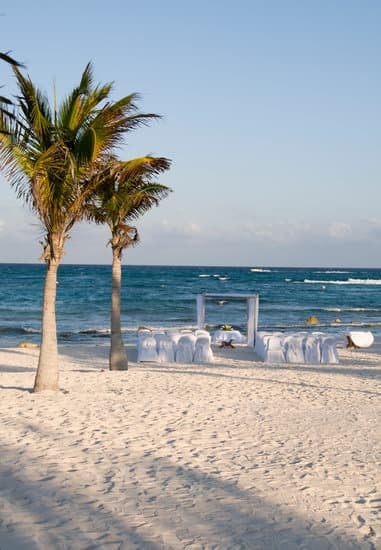Are you wondering how early to send invitations for a destination wedding? Destination weddings have become increasingly popular in recent years, offering couples the chance to exchange vows in breathtaking locations around the world.
However, planning a destination wedding comes with its own set of unique challenges, including determining the right timing for sending out invitations. In this article, we will explore the importance of setting the stage for your destination wedding by sending out invitations early and providing guests with ample time to plan for this special event.
As more couples opt for destination weddings, it has become essential to understand the timeline and factors involved in planning such an affair. From choosing the perfect location to managing international guest lists, there are numerous details to consider when it comes to hosting a memorable destination wedding. One crucial aspect of this process is knowing when to send out save-the-dates and formal invitations, which can greatly impact the attendance and overall success of your event.
Sending out invitations early for a destination wedding can make all the difference in ensuring that your loved ones can join you on your special day. By giving guests plenty of notice, they will have time to make travel arrangements and budget for any associated costs.
This is especially important when inviting guests from different countries, as it allows them to navigate any necessary visa applications or travel requirements well in advance. Throughout this article, we will delve into various considerations and tips for effectively managing invitations and guest responses for your upcoming destination wedding.
Understanding the Destination Wedding Timeline
It’s no secret that destination weddings have become increasingly popular in recent years. From exotic beach resorts to romantic European cities, couples are opting for unique and unforgettable locations to tie the knot. However, with the added logistics of travel and accommodations, planning a destination wedding requires careful consideration and an extended timeline.
When it comes to understanding the destination wedding timeline, one of the most crucial factors to consider is when to send save the dates and invitations. Unlike traditional weddings, where invitations may go out a few months in advance, destination weddings often require much more lead time. Here’s a breakdown of the typical timeline for planning a destination wedding:
- 12-18 months before: Send save the dates
- 8-12 months before: Send formal invitations
- 2-3 months before: Follow up with guests who have not RSVP’d
Sending save the dates well in advance is essential for giving your guests ample time to make travel arrangements, especially if they need to request time off work or budget for the trip. Likewise, sending formal invitations at least eight months before the wedding ensures that guests have enough time to plan and RSVP.
This extended timeline also allows you as a couple to have a better idea of how many guests will be attending, which can inform other important decisions such as booking accommodations and finalizing event details.
Factors to Consider When Setting the Date
When it comes to setting the date for a destination wedding, there are several important factors to consider. One of the first things to think about is the location itself. Consider the weather patterns, peak tourist seasons, and any local events that could impact availability and pricing for accommodations. For example, if you’re planning a beach wedding in the Caribbean, you may want to avoid hurricane season or major music festivals that could drive up costs.
Another crucial factor to consider is the travel time for your guests. If many of your invitees will be coming from different parts of the world, you’ll want to choose a date that allows for ample travel time. This might mean avoiding dates close to major holidays or ensuring that there are convenient flight options available on the chosen date.
Budget is also an important consideration when setting the date for a destination wedding. By choosing a date well in advance and sending out early invitations, you give your guests more time to budget and plan for their attendance at your special event. This can also give them more opportunities to take advantage of discounts on flights and accommodations.
Ultimately, by carefully considering all these factors and setting the date accordingly, you can ensure that your destination wedding is not only memorable but also convenient for your guests.
| Factors to Consider | When Setting the Date |
|---|---|
| Location | Weather patterns, peak tourist seasons, local events |
| Travel Time | Avoiding major holidays, ensuring convenient flights |
| Budget | Giving guests time to plan and budget with early invitations |
The Case for Sending Early Invitations
Sending out invitations for a destination wedding requires careful planning and consideration, especially when it comes to timing. One of the most common questions couples have when planning a destination wedding is how early to send invitations. Sending out invitations early for a destination wedding is crucial for several reasons, and it can make a significant difference in the overall success of the event.
First and foremost, sending out invitations early for a destination wedding gives guests ample time to plan and budget for the trip. Traveling to a different location for a wedding requires more logistical coordination than attending a local event, so it’s essential to give guests as much notice as possible. This is especially true if the location of the destination wedding requires international travel, as guests may need additional time to secure passports or visas.
In addition to ensuring that guests have enough time to make travel arrangements, sending out early invitations for a destination wedding also allows for better RSVP management. By giving guests an extended period to respond, couples can more accurately gauge attendance numbers and plan accordingly. This can be particularly important when working with vendors and venues in the chosen destination, as they often require firm numbers well in advance.
| Reasons | Benefits |
|---|---|
| Time to plan and budget for the trip | Guests can make necessary arrangements without feeling rushed |
| Better RSVP management | Couples can more accurately gauge attendance numbers and plan accordingly |
Designing and Ordering Destination Wedding Invitations
When planning a destination wedding, one of the key components is creating and sending out the perfect invitations. Since these events often require guests to travel, it’s essential to give them ample time to plan and prepare for the trip. Here are some tips for designing and ordering destination wedding invitations:
- Consider the location: Incorporate elements of the destination into the design of your invitations. Whether it’s a tropical beach, a charming European city, or a rustic vineyard, let the location inspire the look and feel of your invitations. This will not only set the tone for your event but also serve as a memento for your guests.
- Include all necessary information: Since a destination wedding involves more logistics than a traditional local wedding, make sure to include all relevant details in your invitations. This may include travel information, accommodation options, local activities or attractions, and any pre or post-wedding events you have planned.
- Order early: Given that destination weddings often require guests to make travel arrangements far in advance, it’s important to order your invitations early. Aim to send them out at least six to eight months before the wedding date so that your guests have enough time to RSVP and plan their trip accordingly.
By putting thought into the design, content, and timing of your destination wedding invitations, you can ensure that your guests are well-informed and excited about attending your special day. Remember that these invitations not only serve as an announcement of your upcoming nuptials but also as an introduction to what promises to be an unforgettable celebration in a unique location.
Navigating International Guest Lists
When planning a destination wedding, one of the unique challenges that couples may face is managing an international guest list. Inviting guests from different countries can add layers of complexity to the planning process, but with some thoughtful consideration and careful communication, it can be a seamless and inclusive experience for all involved.
Understanding International Travel Requirements
Before sending out invitations to international guests, it’s important to research and understand the travel requirements for visitors from different countries. This could include visa arrangements, passport validity, and any potential travel restrictions or advisories. By providing this information along with the invitation, guests will have ample time to make necessary arrangements well in advance of the wedding date.
Language and Communication Considerations
When navigating an international guest list for a destination wedding, it’s important to consider language barriers and accommodate accordingly. Including bilingual invitations and RSVP cards can help ensure that all guests feel welcome and informed about the details of the event. Additionally, providing key information on accommodations, local attractions, and transportation options in multiple languages can enhance the overall guest experience.
Cultural Sensitivity and Etiquette
Each culture has its own set of customs and etiquette when it comes to weddings, so it’s crucial to be mindful of these differences when inviting guests from different countries. For example, some cultures may expect more formal or extended notice for a wedding invitation, while others may have specific gift-giving traditions. Taking the time to understand and respect these cultural nuances will demonstrate thoughtfulness and consideration towards all guests attending your destination wedding.
By carefully navigating the international guest list for your destination wedding, you can create an inclusive and memorable experience for everyone involved. From understanding travel requirements to accommodating language preferences and cultural sensitivities, thoughtful planning and communication will ensure that all guests feel welcome and informed as they embark on this special journey with you.
Managing RSVPs and Tracking Responses
When it comes to planning a destination wedding, managing RSVPs and tracking responses can be a bit more challenging than traditional weddings. With guests coming from different parts of the world, it’s crucial to have a system in place to keep track of who will be attending your special day. Here are some tips for effectively managing RSVPs and tracking responses for a destination wedding.
Utilize Online RSVP Platforms
In this digital age, utilizing online RSVP platforms can make the process of collecting responses much easier. Websites like The Knot, WeddingWire, or even creating a custom wedding website can provide a centralized location for guests to RSVP. Not only does this streamline the process for both you and your guests, but it also allows you to easily keep track of responses and meal selections.
Communicate Clearly With Your Guests
When sending out invitations for your destination wedding, be sure to clearly communicate the RSVP deadline. Since guests will need additional time to plan and budget for travel arrangements, it’s important to set an earlier RSVP date compared to traditional weddings. Additionally, providing detailed information about accommodations, transportation options, and local attractions can help guests make their decision about attending your wedding.
Follow Up With Guests
As the RSVP deadline approaches, don’t hesitate to follow up with any guests who haven’t responded. This gentle reminder can serve as a nudge for those who may have overlooked their response or are still making arrangements. Following up through email or phone calls can help ensure that you have an accurate headcount as you finalize arrangements with your venue and vendors.
By following these tips for managing RSVPs and tracking responses, you can alleviate some of the challenges that come with planning a destination wedding. Effective communication and organization will help ensure that you have an accurate guest count as you prepare for your special day.
Final Reminders and Tips for a Successful Destination Wedding
In conclusion, when it comes to planning a destination wedding, one of the most crucial factors to consider is the timing of sending out invitations. As discussed in this article, the timeline for a destination wedding is unique and requires special attention to ensure that guests have ample time to plan for the trip.
By understanding the importance of sending early invitations, considering key factors when setting the date, and taking into account the international nature of guest lists, couples can set themselves up for a successful and memorable destination wedding experience.
Sending out invitations for a destination wedding should not be approached with a casual mindset. It is essential to understand that guests will need more time to book flights, accommodations, and possibly take time off work when attending a wedding at a location that is not local.
With this in mind, it is recommended to send save-the-date cards 8-12 months before the wedding date and formal invitations 3-4 months in advance. By adhering to this timeline, couples can ensure that their guests have plenty of time to make arrangements and commit to attending the celebration.
Furthermore, it’s important for couples planning a destination wedding to create invitations that effectively convey all necessary information while also capturing the spirit of the location. Whether it’s through incorporating local elements into the design or providing additional details about travel arrangements and activities surrounding the event, thoughtful touches on invitations can enhance guests’ excitement and anticipation for the destination wedding.
Ultimately, by carefully managing RSVPs and keeping open lines of communication with guests throughout the process, couples can navigate any challenges associated with hosting a destination wedding and create an unforgettable experience for all involved.
Frequently Asked Questions
How Far in Advance Should I Book a Destination Wedding?
The ideal time to book a destination wedding is 9-12 months in advance. This allows guests enough time to plan and make travel arrangements, and also gives you plenty of time to work with local vendors at your destination.
Is 3 Months Too Early to Send Out Wedding Invitations?
Sending out wedding invitations 3 months before the date may be cutting it close, especially for a destination wedding where guests need extra time to plan. It’s better to send them out around 6-8 months in advance so guests have ample time to make travel plans.
How Long Before Destination Wedding Should RSVPs Be Due?
For a destination wedding, it’s best to set an RSVP deadline about 2-3 months before the wedding date. This will give you enough time to finalize details with vendors and accommodations based on the number of confirmed guests.

I have been involved in marriages for over 20 years helping couples and singles understand more about them.





